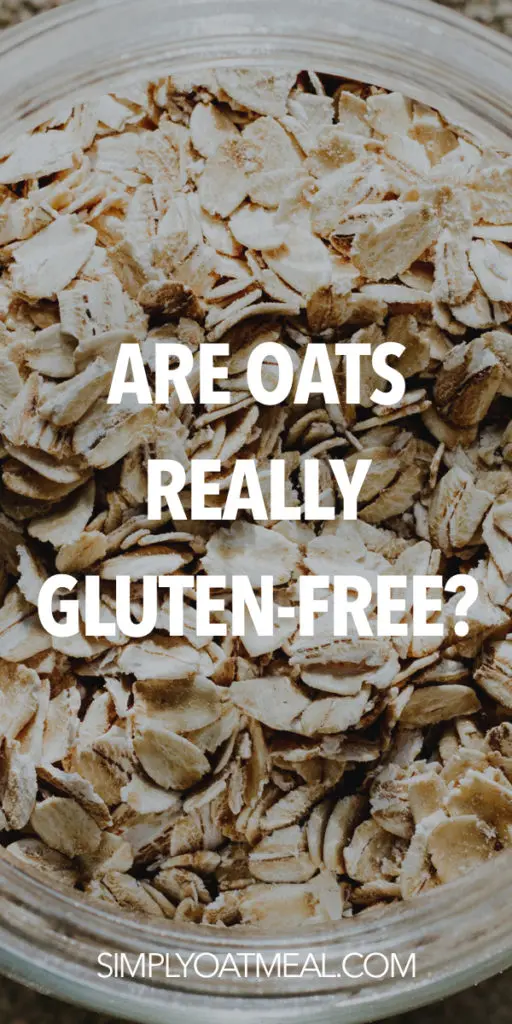Oats are a nutritious whole grain filled with many health benefits. Let’s dive a bit deeper to explore whether or not you can include oats in a gluten-free diet.
Many gluten-free recipes use oats as the main ingredients. Oats are used in a variety of foods such as overnight oatmeal, cookies and muffins. However, are oats really safe for people with a gluten-intolerance?
Celiac disease is a severe immune disease that damages the small intestine of people who consume gluten. Gluten is a protein found in wheat, rye and barley, which are found in a large number of processed foods. So the question remains, are oats really gluten-free?
The quick answer is YES! Uncontaminated oats are in fact gluten-free and safe for most people with celiac disease to consume. However, the main problem that plagues gluten-free foods is contamination.

Gluten Cross Contamination
There are three types of food contamination: biological, chemical and physical. Gluten cross contamination is a result of gluten-free food coming into contact with food containing gluten.
A majority of commercial oats manufactures also process wheat, barley and rye, which cross contaminates the oats. For someone following a gluten-free diet, the consumption of gluten is entirely avoided.
Celiac disease is not a fad! Even the slightest trace of gluten causes extreme discomfort for anyone with celiac disease. [1] [2]
So, are regular
Quaker Oats gluten-free? Probably not, due to contamination from within the
processing plant.
Furthermore,
oats can be contaminated on an agricultural level. When oats are grown in a
field directly next to a crop of wheat, cross-contamination is unavoidable.
To extend
the thought a bit further, realize that the same equipment could also be used
to harvest the crops. And of course this results in it’s own version of
cross-contamination.
The amount
of gluten cross contamination can also vary from batch to batch. Therefore, one
box of conventional oats may be ok, while another lot may cause a terrible
reaction for someone with gluten-intolerance.
Are whole grain oats gluten-free?
Whole grain oats are a gluten-free food, however, the concern remains with cross-contamination from growing conditions, harvesting equipment and food processing facilities.
The fact of the matter is that studies examining oat products have identified level of gluten surpassing the standards set for gluten-free foods. Even as little as 20 ppm of gluten can cause inflammation in someone with gluten-sensitivity. [3]
One study found 109 commercial oat products to be contaminated with mixture of wheat, barely and rye. [4] [5]
This mistreatment means that conventionally grown oats are unsafe for someone with a strict gluten-free diet.
Which oats are gluten-free?
Because
oats are generally contaminated with gluten during harvest or production, many
companies have begun to process oats separately. Nowadays, they use clean
equipment and grow in fields that are dedicated to gluten-free processing.
So far, labels certifying gluten-free oats and oatmeal can be trusted. [6]
Most people
with celiac disease, wheat allergy or gluten-intolerance can safely eat pure
oats. Studies have demonstrated that
people with gluten sensitivity can eat 2–3.5 ounces (50–100 grams) of pure oats
per day without experiencing negative effects. [7] [8]
Another study treated celiac disease patients
that consumed oats everyday for up to 8 years without experiencing mucus
development in the small intestine or gastrointestinal symptoms. [9]
It’s best to completely avoid conventionally
grown oats when concerned about gluten sensitivity. Gluten-free oats are widely
available, and should be used exclusively if you have any concern about
cross-contamination.
Can celiacs eat gluten-free oats?
There is one
more thing to discuss. We previously mentioned that oats are safe for most people with gluten sensitivity.
Now is a
great time to mention that some people face difficulty digesting oats. Research
supports both sides of the coin on this matter.
Gluten-free oats appear to be safe to
eat for a large majority of people with celiac disease. However, evidence shows that the avenin
protein found in oats can trigger an immune response
with symptoms similar to gluten
intolerance.
The argument being that some researchers believe that the oats are tainted by trace amounts of cross-contamination; while other academics have found indication that a small percentage of people show signs of oats side effects.
As a result, some people may need to avoid oats due to a possible food allergy related to oats.
Tips for buying gluten free oats
Reading the labels is the best way to ensure you are purchasing gluten-free oats. The FDA has set strict regulations for gluten-free foods that apply to four different food labeling terms:
- gluten-free
- free of gluten
- no gluten
- without gluten
All foods with these distinctions must have less than 20 parts per
million of wheat, rye, barley, or other gluten
cross-contamination. [10]
When buying gluten-free
oats, read the labels carefully.
Gluten-free oats and oatmeal products exist, and are generally located in the gluten-free or the natural-foods section of the supermarket.
If your local market doesn’t carry any options, consider ordering specific brands online. Bob’s Red Mill Gluten-Free Extra Thick Rolled Oats is the brand we use at home.
If you have any concerns, stay away from processed or homemade foods that contain oats that you do not know the source. Stick with what makes you feel the most comfortable otherwise you risk having an adverse reaction.
So if you’re on a strict gluten-free diet, then safely grab your oats with confidence.
